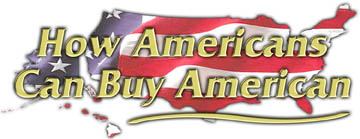 Supporting American-Made Products and Services from American-Owned Companies |
When 'Made in America' doesn't mean American made
Our Buy American Mention of the Week! by Roger Simmermaker December 12, 2013 If you've seen the new 12-ounce cans of StarKist "chunk light tuna" in your local supermarket lately, you might be presently surprised if you've also noticed the 'Made in America' label. But StarKist, which recently celebrated its 50th anniversary in American Samoa, doesn't quite meet what most would consider reasonable standards that would allow the company to use the coveted 'Made in America' label. There are quite a few reasons why: For starters, StarKist isn't even an American-owned company but rather a mere U.S. subsidiary of South Korean-based Dongwon Industries, which bought the company from Del Monte in 2008. However, since StarKist cans its tuna in a U.S. territory - American Samoa - it can technically carry the 'Made in America' label. Second, according to a report from the U.S. General Accounting Office, over 75 percent of StarKist's cannery employees are foreign workers that commute from neighboring Samoa, which is an independent country. Third, it's almost impossible to tell if the tuna was caught with a U.S. vessel or a foreign-flagged vessel. Commenting on StarKist's recent 'Made in America' campaign, U.S. seafood enthusiast and activist Jonathan Gonzalez asked "What's up with the new...label?" A spokesperson for American-owned American Tuna - a company that was profiled in my book My Company 'Tis of Thee: 50 Patriotic American Companies American Consumers Should Know About - chimed in as well: "Foreign flag vessels, using who knows what gear type, no traceability, canned in Samoa. Hilarious." Fourth, even though American Samoa is a U.S. territory, it is not required to comply with certain U.S. laws. The federal minimum wage in the United States is currently $7.25 per hour, but in American Samoa is it only $4.76 per hour. The difference in wage rates might explain why the tuna caught in the North Pacific by American-owned American Tuna and canned in California costs more than the South Korean-owned StaKist tuna caught in international waters and canned in American Samoa. Our federal government has failed to establish reasonable labeling standards to properly educate American consumers so they can make buying decisions based on their own personal values. There are numerous loopholes in the current Country of Origin Labeling (COOL) guidelines according to the research of Michele Nash-Hoff, author of Can American Manufacturing be Saved? Why we should and how we can and owner of the website www.savingusmanufacturing.com. For example, raw seafood requires a country-of-origin label, but if it happens to be cooked, smoked, or cured, it requires no labeling since the USDA exempts "processed" versions of foods that would normally fall under the COOL guidelines. Here's another example. Let's say you enjoy purchasing peanuts, pecans, or macadamia nuts from your favorite grocery store. The good news is that these nuts normally need to be labeled under COOL guidelines. But the bad news is that if they happen to be roasted, the USDA considers them to be a "processed" food, and no labeling is required. This broad interpretation by the USDA of the word "processed" means that those frozen dinners from the grocery store that need to be cooked in the microwave don't require country-of-origin labels. That's why we see so many packages with "Distributed by" information instead. One would think the USDA would want more country-of-origin labeling and not less, since the main goals of the labeling in the first place are to promote and create U.S. jobs, and to ensure food safety for American consumers. More research conducted by Michele Nash-Hoff reveals some potential bright spots by certain companies that have at least some commitment to accurate labeling. According to Nash-Hoff, "The good news about Gorton's fish products is that the labeling on their grilled salmon states 'Made with 100% wild-caught salmon.'" Unfortunately, however, Gorton's is merely a U.S. subsidiary of the Japanese-owned parent company Nippon Suisan Kaisha. The best advice? Stick with American-owned companies that offer unprocessed meats and nuts (which means no cooked, cured, smoked, or roasted products according the USDA). Sticking with American-owned food companies means that you'll have to cross Japanese-owned Gorton's off your list, as well as Smithfield Foods, which was recently acquired by Chinese-owned Shuanghui International Holding Ltd. America needs less foreign investment and more American investment. 1895
|
